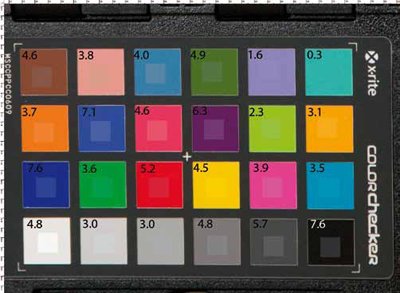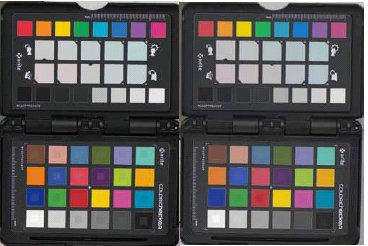articles/Digital/colourcheckerpassport-page2
X-Rite ColorChecker Passport - part 2 of 1 2 3 4
by Mike McNamee Published 01/12/2009

Uncorrected and direct from the camera most images contain residual errors. All the calibration methods improve the situation even if it is only to correct the baseline exposure and white balance.
In Use
The first task is to install the Adobe DNG Converter, which is in the same download as the Camera RAW updaters. Adobe DNG then appears on your desktop and you open this dialogue box to convert RAW files of the target to DNG format. This only took two seconds per file and only needs to be done on the test shots, not the entire shoot. The test shot is dragged onto the open window of Passport and about 20 seconds later you are able to save a settings file for use with all images from the particular camera/lens/lighting combination. The software is smart enough to autolocate the Macbeth Chart in the image and carry out its measurements automatically. The Passport chart should represent at least 10% of the area in the image.
Testing
Test 1 Overcast Sky
We used a Nikon D200 as the test-bed camera, set at ISO 200 and using a Nikkor 105mm micro lens. The measured, manual exposure was 1/250 F5.0 and we bracketed five frames at ¹»₃ stop intervals. We chose a manual white balance setting of 'cloudy' and photographed initially in a northerly-lit, cloudy sky.
The RAW files were DNG processed, opened in ACR and measured in the 'as-received' state. The key image (ie centre of the bracket set) was over-exposed by 2/10 of a stop as assessed by the mid-tone grey and was exactly correct on white balance. Overall then, this was not a testing image for a profiling algorithm to work upon.

The Rags Gardner scripting has been employed to superimpose the 'true' values as an overlay on top of the file values. If you can see a small inner square on the patches of the lower chart then there is a residual error. Note that although the chart on the right is low in contrast it is actually more accurate.
To test the quality of the profile build we used the Rags Gardner 'Read Color Checker' script to report on the residual errors. Using the Passport profile actually increased the errors over the 'as-shot' image. The Rags Gardner profiling routine just about halved the overall error statistics when compared with the 'as-received' and 'Passported' files.
The residual mean ΔE 2000 errors were as follows
Please Note:
There is more than one page for this Article.
You are currently on page 2
- X-Rite ColorChecker Passport page 1
- X-Rite ColorChecker Passport page 2
- X-Rite ColorChecker Passport page 3
- X-Rite ColorChecker Passport page 4
1st Published 01/12/2009
last update 09/12/2022 14:52:38
More Digital Articles
There are 0 days to get ready for The Society of Photographers Convention and Trade Show at The Novotel London West, Hammersmith ...
which starts on Wednesday 14th January 2026





